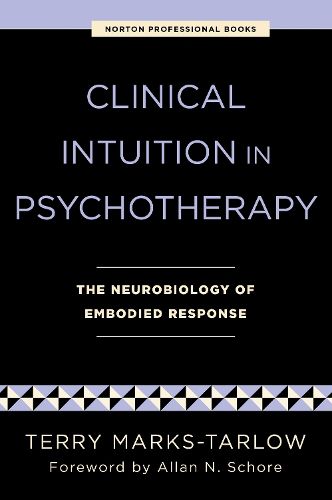Readings Newsletter
Become a Readings Member to make your shopping experience even easier.
Sign in or sign up for free!
You’re not far away from qualifying for FREE standard shipping within Australia
You’ve qualified for FREE standard shipping within Australia
The cart is loading…






What actually happens in psychotherapy, outside the confines of therapeutic models and techniques? How can clinicians learn to pick up on interpersonal nuance, using their intuition to bridge the gap between theory and practice? Drawing from 30 years of clinical experience, Marks-Tarlow explores the central-yet neglected-topic of intuition in psychotherapy, sharing clinical insights and intuitions that can help transform traumatized brains into healthy minds.
Bridging art and science, Clinical Intuition in Psychotherapy is grounded in interpersonal neurobiology, and filled with rich case vignettes, personal stories, and original artwork. In the early chapters of the book, Marks-Tarlow defines clinical intuition as a right-brain, fully embodied mode of perceiving, relating, and responding to the ongoing flows and changing dynamics of psychotherapy. She examines how the body "has a mind of its own" in the form of implicit processes, uncovering the implicit roots of clinical intuition within human empathy and emphasizing the importance of play to clinical intuition. Encouraging therapists to bring their own unique senses of humor to clinical practice, she explains how the creative neural powers of playfulness, embedded within sensitive clinical dialogs, can move clients' lives toward lasting positive affective growth.
Later chapters explore the play of imagination within clinical intuition, where imagery and metaphor can lead to deeper insight about underlying emotions and relational truths than words alone; the developmental foundations for intuition; and clinical intuition as a vehicle for developing and expressing wisdom. At the close of each chapter, reflective exercises help the reader personally integrate the concepts.
Part of the Norton Series on Interpersonal Neurobiology, this wonderful guidebook will help clinicians harness the power of spontaneous intuitive thinking to transform their therapeutic practices.
$9.00 standard shipping within Australia
FREE standard shipping within Australia for orders over $100.00
Express & International shipping calculated at checkout
What actually happens in psychotherapy, outside the confines of therapeutic models and techniques? How can clinicians learn to pick up on interpersonal nuance, using their intuition to bridge the gap between theory and practice? Drawing from 30 years of clinical experience, Marks-Tarlow explores the central-yet neglected-topic of intuition in psychotherapy, sharing clinical insights and intuitions that can help transform traumatized brains into healthy minds.
Bridging art and science, Clinical Intuition in Psychotherapy is grounded in interpersonal neurobiology, and filled with rich case vignettes, personal stories, and original artwork. In the early chapters of the book, Marks-Tarlow defines clinical intuition as a right-brain, fully embodied mode of perceiving, relating, and responding to the ongoing flows and changing dynamics of psychotherapy. She examines how the body "has a mind of its own" in the form of implicit processes, uncovering the implicit roots of clinical intuition within human empathy and emphasizing the importance of play to clinical intuition. Encouraging therapists to bring their own unique senses of humor to clinical practice, she explains how the creative neural powers of playfulness, embedded within sensitive clinical dialogs, can move clients' lives toward lasting positive affective growth.
Later chapters explore the play of imagination within clinical intuition, where imagery and metaphor can lead to deeper insight about underlying emotions and relational truths than words alone; the developmental foundations for intuition; and clinical intuition as a vehicle for developing and expressing wisdom. At the close of each chapter, reflective exercises help the reader personally integrate the concepts.
Part of the Norton Series on Interpersonal Neurobiology, this wonderful guidebook will help clinicians harness the power of spontaneous intuitive thinking to transform their therapeutic practices.